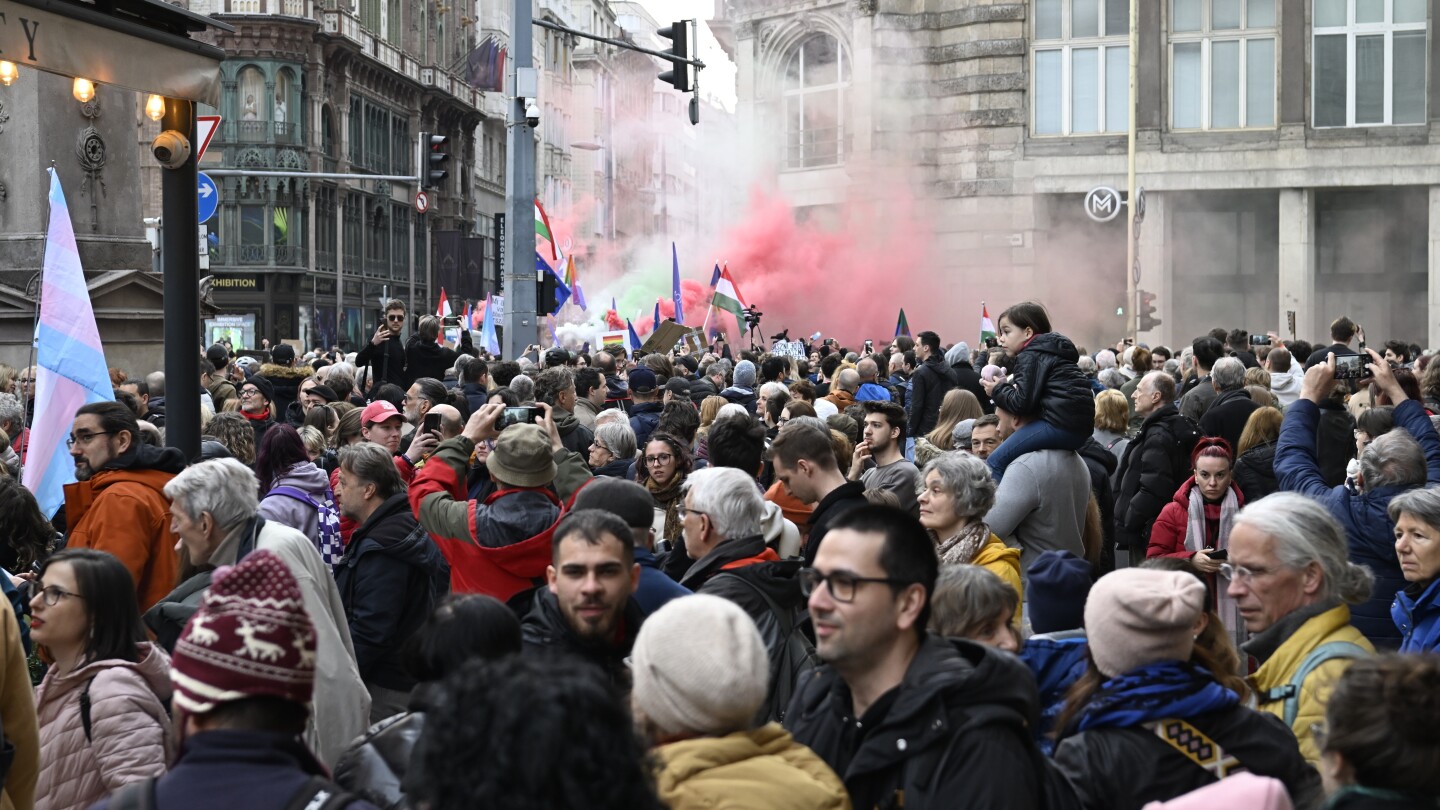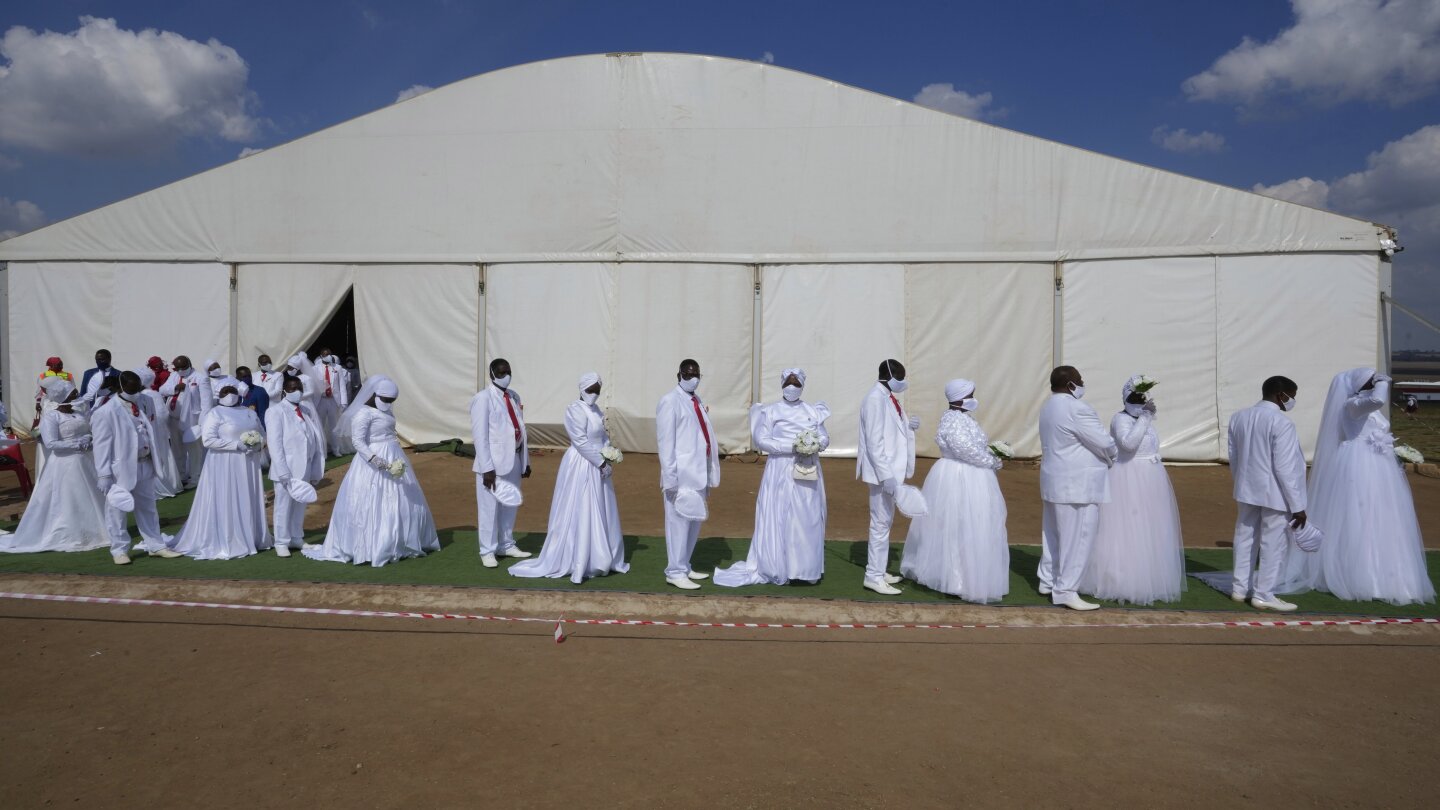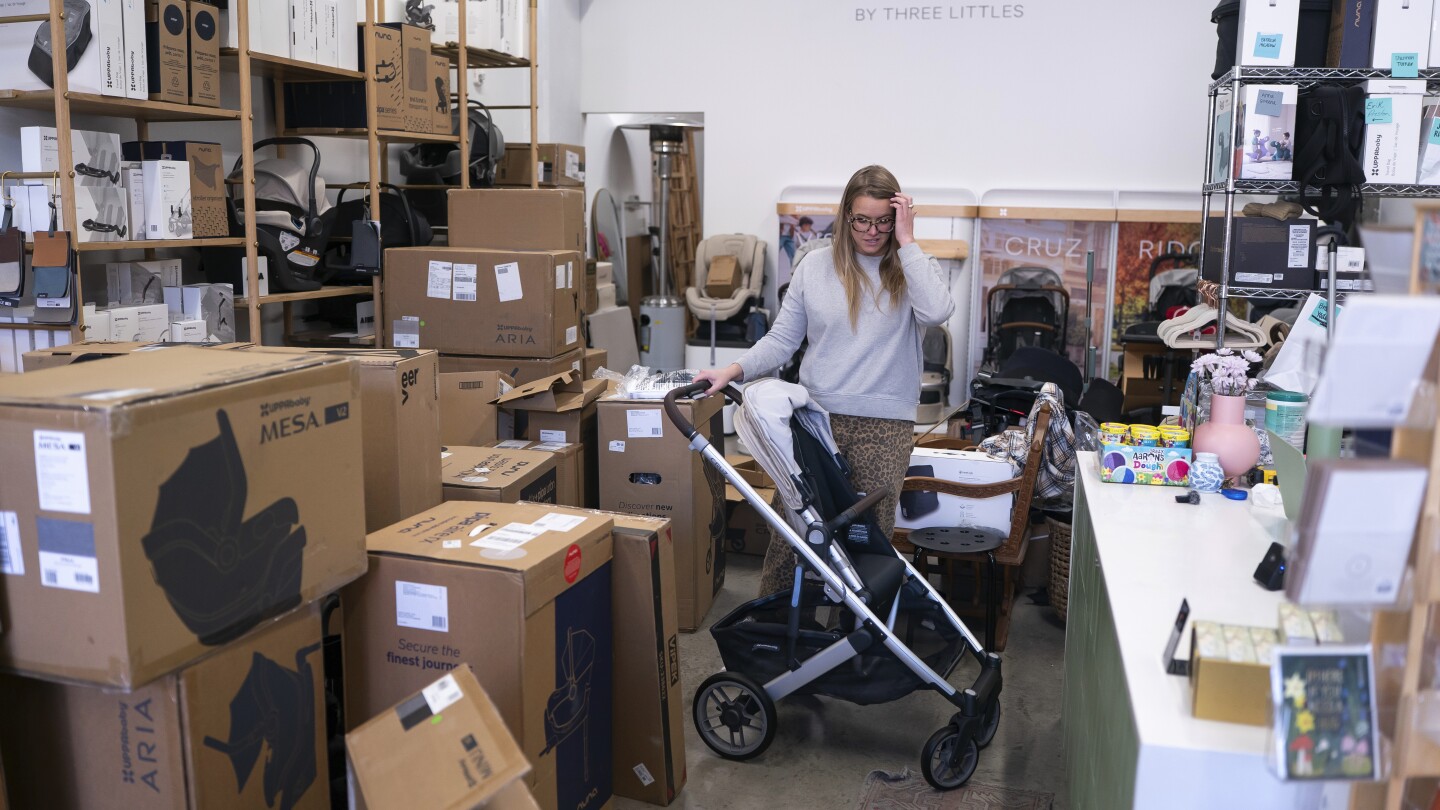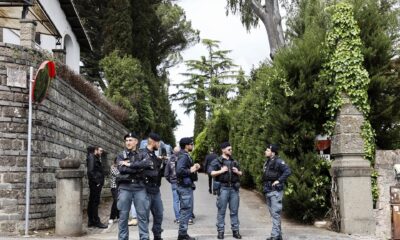Lifestyle
Protesters in Hungary block roads, bridges in opposition to new law banning LGBTQ+ Pride events

BUDAPEST, Hungary (AP) — Several thousand protesters blocked major thoroughfares and three bridges in the center of Hungary’s capital on Tuesday in opposition to a recent law that effectively bans LGBTQ+ Pride events and restricts Hungarians’ right to assembly.
The demonstration was the second within a week since Hungary’s ruling Fidesz party used its two-thirds parliamentary majority last Tuesday to fast-track the law, seen by critics as the government’s latest crackdown on the rights of the country’s LGBTQ+ community.
Chanting “democracy” and “assembly is a fundamental right,” thousands of the demonstrators poured onto one of the city’s busiest roads, igniting colorful smoke bombs and blocking traffic. In the coming hours, they went on to blockade three of the city’s bridges spanning the Danube, facing lines of police blocking their path.
One of the demonstrators, 26-year-old Paula Antalfy, said she believed the government’s recent steps to ban certain public events were “yet another step in the direction of dismantling democracy.”
“I feel like love should be free, and who you love is not a decision in any way,” she said. “That we would not be able to gather like this, as we do now, and stand in our own streets, in our own city, is something I just can’t agree with.”
Hungary’s new law, which is reminiscent of similar restrictions against sexual minorities in Russia, amends rules on assembly to make it an offense to hold or attend events that violate Hungary’s contentious child protection legislation, which prohibits the “depiction or promotion” of homosexuality to minors under 18.
Authorities may now use facial recognition tools to identify individuals that attend prohibited events — such as the popular Budapest Pride which draws tens of thousands each year — and can issue fines for violators of up to 200,000 Hungarian forints ($546).
Hungary’s right-wing populist prime minister, Viktor Orbán, has in recent years taken aim at the country’s LGBTQ+ community, prohibiting same-sex adoption and — in a 2021 child protection law — banning any LGBTQ+ content including in television, films, advertisements and literature that is available to minors.
Orbán’s party plans to adopt a constitutional amendment in April that will codify the ban on public LGBTQ+ events. His government argues that its policies are designed to protect children from “sexual propaganda,” but critics view them as part of a broader effort to scapegoat sexual minorities and mobilize his conservative base.
Last week, a spokesperson for the United Nations’ human rights commission said that the recent law “results in arbitrary and discriminatory restrictions on the rights of LGBTIQ+ individuals to freedom of expression, peaceful assembly and privacy.”
The statement drew attention to a part of the law which authorizes the government to use facial recognition technology to identify and fine participants of prohibited events, saying such tools “should never be deployed in a discriminatory manner through targeted surveillance of peaceful assemblies of LGBTIQ+ persons or other marginalized groups.”
Budapest Pride organizers, as well as Budapest’s mayor, have vowed to go ahead with the city’s Pride events, which are set to celebrate their 30th anniversary this summer. In response to the recent law, Pride organizers wrote: “This is not child protection, this is fascism.”
The organizer of Tuesday’s protest, independent lawmaker Ákos Hadházy, called on Hungarians to continue taking to the streets until the government repeals the law. He told the crowd the government’s measures to restrict the right of assembly and utilize surveillance tools against protesters was the start of “techno-fascism” in Hungary.
Benedek Lakos, a 27-year-old member of Budapest’s LGBTQ+ community who attended the Tuesday demonstration, said he has not previously been active in expressing his opinion about actions taken by Hungary’s government.
But the latest law, he said, had been “the last straw.”
“I feel now for a number of reasons that we have reached a level where, if there are no visible consequences for this (law) from the people, we can just start digging our own graves,” he said.
Lifestyle
A Pentecostal church in South Africa holds mass Easter weddings for 3,000 people, some polygamous

JOHANNESBURG (AP) — A Pentecostal church in South Africa celebrated Easter Sunday with mass wedding ceremonies for around 3,000 people, with many of them entering into polygamous marriages.
The International Pentecost Holiness Church said mass weddings are part of its Easter festivities and the tradition of polygamy, which is observed in some African cultures, has been incorporated into the church.
Sunday’s ceremonies would see some men marry their sixth or seventh wives, church spokesperson Vusi Ndala said. Other grooms were set to marry multiple brides at one time, Ndala said.
“Polygamy is not only embraced but held in high regard” in the church, Ndala said.
A man with his wife and two of his brides walk, during mass Easter weddings for 3,000 people, some polygamous, at the International Pentecost Holiness Church in Heidelberg, east of Johannesburg, South Africa, Sunday, April 20, 2025. (AP Photo/Themba Hadebe)
Couples dance as they enter the church building during mass Easter weddings for 3,000 people, some polygamous, at the International Pentecost Holiness Church, in Heidelberg, east of Johannesburg, South Africa, Sunday, April 20, 2025. (AP Photo/Themba Hadebe)
People queue during mass Easter weddings for 3,000 people, some polygamous, at the International Pentecost Holiness Church in Heidelberg, east of Johannesburg, South Africa, Sunday, April 20, 2025. (AP Photo/Themba Hadebe)
The International Pentecost Holiness Church was founded in South Africa in the early 1960s. It is an African-initiated church, meaning it was founded by Africans rather than foreign missionaries, and blends Pentecostal beliefs with local traditions.
The church has held mass weddings before, including in 2023 when around 400 couples or bridal parties tied the knot. It says this year’s event was its largest by far.
Ndala said the large number of people being married this year was because of “a large number of men marrying more than one wife at a go.”
In some cases, grooms brought their current wife or wives to be with them for their new marriage.
The weddings were held at the church’s headquarters, a huge, dome-shaped building in the town of Heidelberg, near Johannesburg, that can seat 60,000 people.
The congregants who were being married waited in long white tents set up in open fields next to the church building, where they were given bridal flowers, food packs and water. They then filed into the church building in long queues, the women wearing white bridal gowns and many of the men in matching white suits and red ties.
Polygamy is legal in South Africa if the union is registered as a customary marriage.
A man with his wife and two of his brides sits inside a marquee ahead of the mass Easter weddings for 3,000 people, some polygamous, at the International Pentecost Holiness Church in Heidelberg, east of Johannesburg, South Africa, Sunday, April 20, 2025. (AP Photo/Themba Hadebe)
A groom in a wheelchair is assisted by a fellow member whilst his two brides walk in front, during mass Easter weddings for 3,000 people, some polygamous, at The International Pentecost Holiness Church in Heidelberg, east of Johannesburg, South Africa, Sunday, April 20, 2025. (AP Photo/Themba Hadebe)
___
AP Africa news: https://apnews.com/hub/africa
Lifestyle
Queen Elizabeth II’s favorite dog breed race for glory in the UK’s Corgi Derby

LONDON (AP) — Some of the fastest canines on four very short legs have raced for glory in Scotland’s annual Corgi Derby.
The Musselburgh Racecourse Corgi Derby was first held in 2022 to mark Queen Elizabeth II’s 70 years on the throne. The late monarch was a devoted corgi fan who owned almost 30 of the breed over the decades, along with a few dorgis – a corgi-dachshund cross.
Four-year-old Juno beat a 16-strong field of dashing dogs dressed in bright sweaters over the 230-foot (70-meter) race on Saturday at the racecourse outside Edinburgh. She came from behind in the final stretch to beat last year’s winner, Rodney.
The winner and her owners, Alisdair Tew and Fran Brandon, were presented with a trophy and dog treats by tennis coach Judy Murray, mother of Scottish star Andy Murray.
Tew told the BBC that “we trained her for this last year but this year we just resorted to just letting her chasing things, particularly seagulls” on Edinburgh’s Portobello Beach.
“Juno is always ready for treats -– that is probably why she won,” he said.
Elizabeth’s love of corgis began in 1933 when her father, King George VI, brought home a Pembroke Welsh corgi they named Dookie
Corgis were often by Elizabeth’s side in the decades before her death in September 2022 — accompanying her on official tours, reportedly sleeping in their own room at Buckingham Palace and occasionally nipping the ankles of visitors or royal family members.
Three corgis even appeared alongside the queen as she climbed into James Bond’s waiting helicopter in the spoof video that opened the 2012 London Olympics.
Lifestyle
Tariffs are likely to make having a baby cost more

Sam Rutledge and his wife have a baby due in mid-July, so they thought they had a few more months to research and buy the gear they’ll need.
But President Donald Trump’s tariff announcement in early April turned the couple’s slow walk into a sprint. In the past few weeks, they’ve bought two strollers, a car seat, a nursery glider, a crib and a high chair. All of them are made overseas.
“These are all pretty expensive under normal conditions, but when it became clear tariffs were coming we decided to buy them in case they became prohibitively expensive,” said Rutledge, who is a high school physics teacher.
Raising a child in America has never been cheap. In the first year alone, it costs an average of $20,384, according to Baby Center, a parenting website. But tariffs – ranging from 10% for imports from most countries to 145% for imports from China — will make it many times more expensive for new parents.
An estimated 90% of the core baby care products and the parts that go into making baby paraphernalia – from bottles and diaper pails to strollers and car seats – are made in Asia, according to the Juvenile Products Manufacturers Association, a U.S. trade group. The vast majority come from China.
“Overseas manufacturing has been the norm in our industry for decades,” said Lisa Trofe, the association’s executive director.
It wasn’t always this way. When Munchkin Inc. CEO Steven Dunn founded his company in 1991, it made baby bottles in California with tooling from New Jersey. But over the years, the manufacturers he used shut down and the cost of doing business in the U.S. skyrocketed. Now, about 60% of Munchkin’s 500 products, from a $5 sippy cup to a $254 Night Owl Stroller with headlights, are made in China.
In response to the tariffs, Dunn halted orders from China and instituted a hiring freeze at Munchkin’s California headquarters, where 320 people are employed. Dunn expects Munchkin will run out of some products within three months.
“There is no possibility of being able to pass on those tariffs” to customers in the form of price increases, he said.
Dunn said he tried to reduce his dependence on China in recent years, shifting some manufacturing to Vietnam and Mexico. He also spent a year communicating with American manufacturers to see if one could make Munchkin’s new Flow Nipple Shield, which allows a breastfeeding mother to see if her milk is flowing. But most said they couldn’t make the complex silicone product, Dunn said. It’s now made in Vietnam.
“There’s not enough tool makers and manufacturing expertise and automation and skilled labor in the U.S. to make the thousands of products the juvenile industry needs,” Dunn said.
Multiple baby brands and companies contacted by The Associated Press didn’t respond or said they weren’t commenting on the tariffs, including Graco, Chicco, Britax, Nuna, Dorel Juvenile, UppaBaby, Evenflo and Bugaboo.
The Juvenile Products Manufacturers Association said it asked the Trump administration for a tariff exemption, arguing that baby products are essential for children’s well-being. Trump exempted some baby products, including car seats and high chairs, from import taxes during his first administration. But he hasn’t said whether he would consider doing so again.
The Associated Press left a message seeking comment with the White House.
Nurture&, a company that makes a popular nursery glider and other baby furniture, said it’s trying to be transparent about the impact of tariffs.
In a recent email, the company told customers it started lowering prices on some items when the tariffs hit. The company, which was founded in 2020, said it would keep those lower prices in place until April 30, but after that it may not be able to absorb the full cost of the import duties.
“These are large purchases, these are investments, and this is a very sensitive life stage,” Nurture& Chief Merchant Jill Gruys said. “We want people to make the best decision for their budget and their family.”
Elizabeth Mahon, the owner of Three Littles, a baby store in Washington, said she’s worried the tariffs will make essential products too expensive for some families.
Mahon volunteers twice per month at the Department of Motor Vehicles, where she teaches people how to buckle their kids safely into car seats. Some families still must be persuaded to use car seats, she said. Mahon fears higher prices would be another deterrent.
“No one is dying if they can’t buy a toy, but if they don’t have access to car seats, kids will get seriously injured,” she said.
At her own store, Mahon is getting notices that some manufacturers plan to introduce steep price increases in May. She feels lucky she could rent a storage facility and build up inventory ahead of the tariffs. For many small businesses, she said, the extra costs are “a death sentence.”
At The Little Seedling baby shop in Ann Arbor, Michigan, owner Molly Ging said she would normally be putting in Christmas orders at this time of year. Instead, she’s sorting through price increase notices from many of the vendors she works with.
“It’s a lot to manage, and I just have no idea how it’s going to play out,” she said.
Business is brisk right now, with customers hoping to beat tariff-related price increases. But Ging worries about her 13 employees – all moms who bring their kids to work – and about whether she can maintain enough inventory to meet future demand.
“Babies don’t stop being born because there’s tariffs,” she said.
-

 Middle East2 days ago
Middle East2 days agoTunisian court hands opposition figures lengthy jail terms | Human Rights News
-

 Middle East1 day ago
Middle East1 day agoIran says progress in nuclear talks with US, confirms third round next week | News
-

 Sports2 days ago
Sports2 days agoShohei Ohtani misses Los Angeles Dodgers’ win over Texas Rangers as he awaits birth of first child
-
Middle East1 day ago
Israeli bombardment of Gaza kills 92 in two days: Health Ministry | Israel-Palestine conflict News
-

 Europe1 day ago
Europe1 day agoLive updates: Trump news on Iran and Ukraine talks, immigration crackdown, tariffs
-

 Europe1 day ago
Europe1 day agoRussia sentences 19-year-old woman to nearly three years in a penal colony after poetic anti-war protest
-

 Europe1 day ago
Europe1 day agoVance, Vatican officials engage in ‘exchange of opinions’ over migrants
-

 Africa2 days ago
Africa2 days agoUnprecedented trial for apartheid atrocities opens in South Africa




